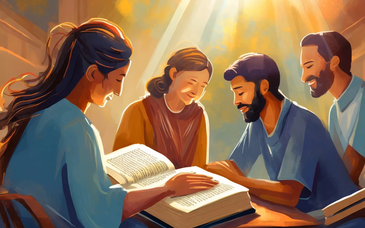Jewish Sources
Josephus on John the Baptist
The Antiquities of the Jews, Book 18, Chapter 5, Section 2
Now some of the Jews thought that the destruction of Herod's army came from God, and that very justly, as a punishment of what he did against John, that was called the Baptist: for Herod slew him, who was a good man, and commanded the Jews to exercise virtue, both as to righteousness towards one another, and piety towards God, and so to come to baptism; for that the washing [with water] would be acceptable to him, if they made use of it, not in order to the putting away [or the remission] of some sins [only], but for the purification of the body; supposing still that the soul was thoroughly purified beforehand by righteousness. Now when [many] others came in crowds about him, for they were very greatly moved [or pleased] by hearing his words, Herod, who feared lest the great influence John had over the people might put it into his power and inclination to raise a rebellion, (for they seemed ready to do any thing he should advise), thought it best, by putting him to death, to prevent any mischief he might cause, and not bring himself into difficulties, by sparing a man who might make him repent of it when it would be too late. Accordingly he was sent a prisoner, out of Herod's suspicious temper, to Macherus, the castle I before mentioned, and was there put to death. Now the Jews had an opinion that the destruction of this army was sent as a punishment upon Herod, and a mark of God's displeasure to him.
Josephus on Jesus Christ
The Antiquities of the Jews, Book 18, Chapter 3, Section 3
"Now there was about this time Jesus, a wise man, if it be lawful to call him a man; for he was a doer of wonderful works, a teacher of such men as receive the truth with pleasure. He drew over to him both many of the Jews and many of the Gentiles. He was [the] Christ. And when Pilate, at the suggestion of the principal men amongst us, had condemned him to the cross, those that loved him at the first did not forsake him; for he appeared to them alive again the third day; as the divine prophets had foretold these and ten thousand other wonderful things concerning him. And the tribe of Christians, so named from him, are not extinct at this day."
The Babylonian Talmud on Jesus
Sanhedrin 43a (200-500 C.E.)
"On the eve of the Passover, Yeshu was hanged. For forty days before the execution took place, a herald went forth and cried, 'He is going forth to be stoned because he has practiced sorcery and enticed Israel to apostasy. Any one who can say anything in his favour, let him come forward and plead on his behalf. But since nothing was brought forward in his favour he was hanged on the eve of Passover!"
The Babylonian Talmud on Jesus
Sanhedrin 107b (200-500 C.E.)
"One day he (Rabbi Joshua) was reciting the Shema (Deuteronomy 6:4) when Jesus came before him. He intended to receive him and made a sign to him. He (Jesus) thinking that it was to repel him, went, put up a brick and worshiped it.....And a Master has said, 'Jesus the Nazarene practiced magic and led Israel astray.'"
Roman Sources
Pliny the Younger on Christians
Letter to Trajan 10.96 - (c.111-117 C.E.)
"I have never been present at an examination of Christians. Consequently, I do not know the nature of the extent of the punishments usually meted out to them, nor the grounds for starting an investigation and how far it should be pressed....I have asked them if they are Christians, and if they admit it, I repeat the question a second and third time, with a warning of the punishment awaiting them. If they persist, I order them to be led away for execution; for, whatever the nature of their admission, I am convinced that their stubbornness and unshakeable obstinacy ought not to go unpunished.....they maintained that their fault or error amounted to nothing more than this: they were in the habit of meeting on a certain fixed day before sunrise and reciting an antiphonal hymn to Christ as God, and binding themselves with an oath not to commit any crime, but to abstain from all acts of theft, robbery and adultery, from breaches of faith, from repudiating a trust when called upon to honour it."
Suetonius on Christians
Vita Nero (De Vita Caesarum - Nero)16.11-13 (c.110 C.E.)
"Punishment was inflicted on the Christians, a class of men given to a new and mischievous superstition."
Tacitus on Jesus and Christianity
The Roman Annals 15.44 (c.115-117 C.E.)
"But all human efforts, all the lavish gifts of the emperor, and the propitiations of the gods did not banish the sinister belief that the conflagration was the result of order. Consequently, to get rid of the report, Nero fastened the guilt and inflicted the most exquisite tortures on a class hated for their abominations, called Christians by the populace.
They got their name from Christ, who was executed by sentence of the procurator Pontius Pilate in the reign of Tiberius. That checked the pernicious superstition for a short time, but it broke out afresh--not only in Judea, where the plague first arose, but in Rome itself, where all the horrible and shameful things in the world collect and find a home."
Miscellaneous and Catholic Sources
Eusebius
Ecclesiastical History, Book 3, Chapter 27
"They observed the Sabbath and the rest of the disciples of the Jews just like them, but on Sundays they performed ceremonies like ours in commemoration of the Lord's Resurrection. Therefore, because of such practices they received their name, since the name of Ebionites signifies the poverty of their understanding, for the poor man is called by this name among the Hebrews."
Justin Martyr
The First Apology to Caesar, Chapter 67 (c. 140-165 A.D.)
"But Sunday is the day on which we all hold our common assembly, because it is the fist day on which God, having wrought a change in the darkness and matter, made the world; and Jesus Christ our Saviour on the same day rose from the dead."
Ignatius of Antioch
Epistle to the Magnesians, Chapter 9 (c. 98-117)
"How, then, shall we be able to live apart from Him, seeing that the prophets were His disciples in the Spirit and expected Him as their Master, and that many who were brought up in the old order have come to the newness of hope? They no longer observe the Jewish Sabbaths, but keep holy the Lord's day, on which, through Him and through His death, our life arose."
Barnabas
The Epistle of Barnabas, Chapter 15
"This is why we also observe the eighth day with rejoicing, on which Jesus also rose from the dead, and having shown himself ascended to heaven."
The Didache (Teaching of the Twelve Apostles) (c. 65-69 A.D.)
The Didache 14:1
"And on the Lord's Day, after you have come together, break bread and offer the Eucharist, having first confessed your offences, so that your sacrifice may be pure."
The Dead Sea Scrolls
(c. 50-100 C.E.)
Messianic Prophecies - 4QTestimonia (or Messianic Anthology, 4Q175 [4QTest])
Fragments of Ecclesiastes - 4Q109 Qohelet a
The Book of Isaiah - 4Q Isaiah Pesher b (4Q162 [4QpIs b])
The Gospel of Thomas
114 (Alleged) Sayings of Jesus
This "gospel" is not accepted by Protestant Christians. Nonetheless, it is a historical document that was written near the time of Jesus Christ. For the purposes of this web site, I won't quote from it.
Resources
Introduction to the Talmud and Midrash, H.L. Strack and G. Stemberger
Jesus Under Fire, J.P. Moreland, Michael Wilkins and Edwin M. Yamauchi
The Letters, Pliny the Younger
Nero, the End of a Dynasty, M.T. Griffin
The Roman Annals, Tacitus
The Works of Josephus, Flavius Josephus

